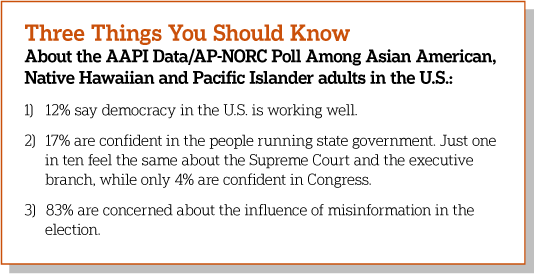
December 13, 2023
With about a month until the first presidential primaries and caucuses, a new AAPI Data/AP-NORC survey finds 68% of people within Asian American, Native Hawaiian and Pacific Islander (AAPI) communities, including 6 in 10 Democrats, believe the country is heading in the wrong direction. About half disapprove of President Biden and there is a lack of confidence in major institutions. Although the AAPI community is pessimistic, their outlook is comparatively less dour than the general public’s view. In November 2023, 81% said the country is heading in the wrong direction and approval for the president’s performance was just 38%.
Trust in the political parties among AAPI communities remains on par with the rest of the United States, generally low, but varied across issues, with 3 in 10 trusting Republicans on the economy, while Democrats are trusted more on climate change (50%) and student debt (44%).
Concerns about misinformation in the U.S. election are high (83%), surpassing concerns about voter suppression (46%), voter fraud (31%), and limitations on free speech (41%).
The survey also finds low confidence in political parties’ presidential nomination processes, with 27% confident in the Democrats’ process and 20% in the Republicans’. AAPI adults are generally not optimistic about the future of either the Democratic (28%) or Republican (15%) parties.
Just 1 in 10 AAPI adults believe democracy is functioning well, though another 47% say it is functioning somewhat well. Most (75%) think the views of ordinary citizens should be important for shaping policies in this country. Fewer think the views of people from similar backgrounds (64%), their own political party (34%), what policy makers think is best (31%), or interest groups (7%) should be important factors.
Confidence in the people running government institutions is also low among AAPI adults. Only 17% express confidence in their state government, though the states are doing better than federal institutions – roughly one in ten are confident in the Supreme Court (12%) and the executive branch (11%), while just 4% feel the same about Congress.
Generational differences within AAPI communities are pronounced, particularly in matters of political trust and priorities for who should shape the country’s laws and policies. AAPI adults under 30 are more skeptical of both Republicans and Democrats on the economy than those aged 60 and older. Thirty-eight percent of AAPI adults under 30 have no trust in either party, compared to 19% of those aged 60 and older.
In terms of governance preferences, about half oppose having a president who bends rules to get things done, or state legislatures able to overturn the results of a presidential election. A similar share favor having experts, not politicians, make decisions about what they think is best for the country (58%), while about half support military leaders refusing unconstitutional orders (47%).

The survey also measures the political leanings of AAPI communities, with about half (52%) identifying as Democrats, just over a quarter (27%) identifying as Republican, and about one in five (21%) identifying as independent or having no party attachment.
The nationwide study was conducted by The AP-NORC Center for Public Affairs Research and AAPI Data from November 6–15, 2023, using the Amplify AAPI Monthly survey drawing from NORC’s Amplify AAPI® Panel designed to be representative of the U.S. Asian American, Native Hawaiian, and Pacific Islander household population. Online and telephone interviews were offered in English, the Chinese dialects of Mandarin and Cantonese, Vietnamese, and Korean with 1,113 Asian American, Native Hawaiian, and Pacific Islanders aged 18 and older living in the United States. The margin of sampling error is +/- 4.4 percentage points.



